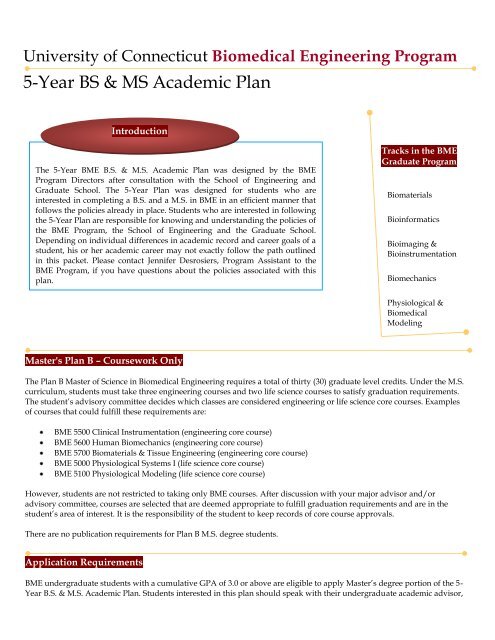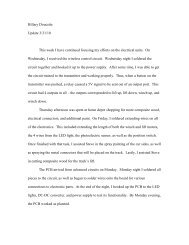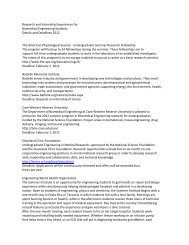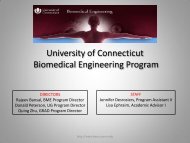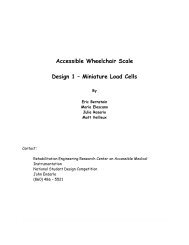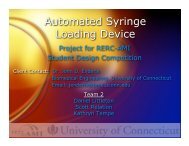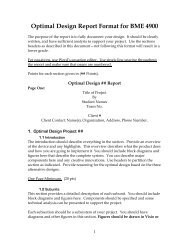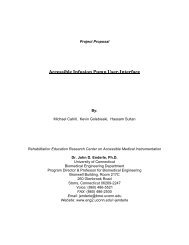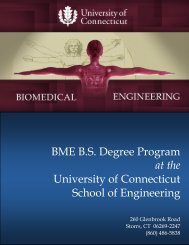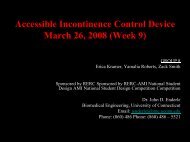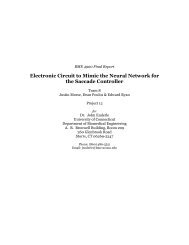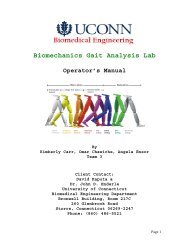5-Year BS & MS Academic Plan - Biomedical Engineering ...
5-Year BS & MS Academic Plan - Biomedical Engineering ...
5-Year BS & MS Academic Plan - Biomedical Engineering ...
You also want an ePaper? Increase the reach of your titles
YUMPU automatically turns print PDFs into web optimized ePapers that Google loves.
University of Connecticut <strong>Biomedical</strong> <strong>Engineering</strong> Program<br />
5-<strong>Year</strong> <strong>BS</strong> & <strong>MS</strong> <strong>Academic</strong> <strong>Plan</strong><br />
Introduction<br />
The 5-<strong>Year</strong> BME B.S. & M.S. <strong>Academic</strong> <strong>Plan</strong> was designed by the BME<br />
Program Directors after consultation with the School of <strong>Engineering</strong> and<br />
Graduate School. The 5-<strong>Year</strong> <strong>Plan</strong> was designed for students who are<br />
interested in completing a B.S. and a M.S. in BME in an efficient manner that<br />
follows the policies already in place. Students who are interested in following<br />
the 5-<strong>Year</strong> <strong>Plan</strong> are responsible for knowing and understanding the policies of<br />
the BME Program, the School of <strong>Engineering</strong> and the Graduate School.<br />
Depending on individual differences in academic record and career goals of a<br />
student, his or her academic career may not exactly follow the path outlined<br />
in this packet. Please contact Jennifer Desrosiers, Program Assistant to the<br />
BME Program, if you have questions about the policies associated with this<br />
plan.<br />
Tracks in the BME<br />
Graduate Program<br />
Biomaterials<br />
Bioinformatics<br />
Bioimaging &<br />
Bioinstrumentation<br />
Biomechanics<br />
Physiological &<br />
<strong>Biomedical</strong><br />
Modeling<br />
Master's <strong>Plan</strong> B – Coursework Only<br />
The <strong>Plan</strong> B Master of Science in <strong>Biomedical</strong> <strong>Engineering</strong> requires a total of thirty (30) graduate level credits. Under the M.S.<br />
curriculum, students must take three engineering courses and two life science courses to satisfy graduation requirements.<br />
The student’s advisory committee decides which classes are considered engineering or life science core courses. Examples<br />
of courses that could fulfill these requirements are:<br />
BME 5500 Clinical Instrumentation (engineering core course)<br />
BME 5600 Human Biomechanics (engineering core course)<br />
BME 5700 Biomaterials & Tissue <strong>Engineering</strong> (engineering core course)<br />
BME 5000 Physiological Systems I (life science core course)<br />
BME 5100 Physiological Modeling (life science core course)<br />
However, students are not restricted to taking only BME courses. After discussion with your major advisor and/or<br />
advisory committee, courses are selected that are deemed appropriate to fulfill graduation requirements and are in the<br />
student’s area of interest. It is the responsibility of the student to keep records of core course approvals.<br />
There are no publication requirements for <strong>Plan</strong> B M.S. degree students.<br />
Application Requirements<br />
BME undergraduate students with a cumulative GPA of 3.0 or above are eligible to apply Master’s degree portion of the 5-<br />
<strong>Year</strong> B.S. & M.S. <strong>Academic</strong> <strong>Plan</strong>. Students interested in this plan should speak with their undergraduate academic advisor,
optimally by their junior year. In order to apply to the Master’s Degree program, all students must submit an application<br />
to the Graduate School. The application can be found at http://grad.uconn.edu/apply.html.<br />
“Education's purpose is<br />
to replace an empty mind<br />
with an open one”<br />
-Malcolm Forbes<br />
Along with the application, students are required to submit three letters of recommendation<br />
and a statement of purpose. It is strongly recommended that students begin gathering<br />
materials for the application (i.e. drafting personal statement, requesting letters of<br />
recommendation from faculty members, etc.) by the<br />
beginning of their senior year. Letters of recommendation and the statement of purpose can<br />
be mailed directly to:<br />
ATTN: Jennifer Desrosiers<br />
260 Glenbrook Rd U-2247<br />
University of Connecticut<br />
Storrs, CT 06269-2247<br />
If preferred, the materials may be emailed as an attachment to Jennd@engr.uconn.edu. Please note: the letters of<br />
recommendation will only be accepted by email if they are sent from the recommenders.<br />
If the student so chooses, they may also include any supplementary materials such as a resume, awards or merits received,<br />
research projects, etc.<br />
Statement of Purpose<br />
A statement of purpose is a personal statement describing your interest in biomedical<br />
engineering; indicate the area of interest you wish to pursue, faculty member(s) you<br />
would like to advise you, why you are applying to the 5-<strong>Year</strong> <strong>Plan</strong>, why receiving a<br />
Master’s Degree is important to your career plans, and any other information that<br />
might be helpful for evaluation purposes.<br />
Areas of interest offered are:<br />
Biomaterials (which includes Biochemical <strong>Engineering</strong>, Drug Delivery,<br />
Cellular & Tissue <strong>Engineering</strong>)<br />
Bioinformatics<br />
Bioimaging & Bioinstrumentation (which includes Biosignal Processing,<br />
Biosensors)<br />
Biomechanics (which includes Biodynamics, Human Performance<br />
<strong>Engineering</strong>, Ergonomics, Cardiac Mechanics, Rehabilitation <strong>Engineering</strong>)<br />
Physiological and <strong>Biomedical</strong> Modeling (which includes Neural<br />
Systems <strong>Engineering</strong>)<br />
A list of BME faculty members and their research areas is provided on page 6.<br />
A quick research on the internet can provide many samples and instructions for<br />
writing a statement of purpose. It is suggested that an applicant look to these resources for help. However, a statement of<br />
purpose must be personal and unique.<br />
Review of Applications<br />
The current Graduate Admissions Committee consists of all faculty members of the BME Graduate Program.<br />
All applications are eligible to be reviewed by the entire Faculty. However only the Faculty in the applicant’s desired tracks<br />
are expected to evaluate the application. The Graduate Admissions Committee will decide on admissions based on Faculty<br />
input, and assign a major advisor for each graduate student upon consent of the faculty member.<br />
The Graduate Application Review Form is used by the faculty to evaluate all BME Graduate Applications. On this form,<br />
faculty members provide a qualitative description of the adequacy of the candidate. Comments concerning GPA, courses<br />
taken, extracurricular activities and other past experiences are usually noted here.<br />
Advisory Committee<br />
The advisory committee is formed after consultation between the major advisor and the student. This committee must
include, in addition to the major advisor, two associate advisors; at least one associate advisor must be a member of the<br />
<strong>Biomedical</strong> <strong>Engineering</strong> Graduate faculty, and one of whom must hold a current appointment as an associate graduate<br />
school faculty member. <strong>Plan</strong>s of study are planned by the advisory committee after consultation with the student.<br />
For questions concerning the<br />
BME Graduate Program,<br />
please visit the Graduate<br />
Program portion of our<br />
website at:<br />
http://www.bme.uconn.edu<br />
You can also contact Jennifer<br />
Desrosiers, Program<br />
Assistant II for the BME<br />
Graduate Program at:<br />
jennd@engr.uconn.edu<br />
The advisor committee should be formed before the student has completed twelve credits<br />
of degree program course work and will supervise the remainder of the student's degree<br />
program. A student’s final plan of study will not be approved for conferral by the<br />
Graduate School unless reviewed and signed by the advisory committee (major advisor<br />
and at least two associate advisors).<br />
Students should contact faculty members in their area(s) of interest while planning their<br />
class schedule for their senior year. Students should inquire what graduate course(s) to<br />
take during their senior year that would be appropriate for their career goals as well as if<br />
that faculty member would be willing to serve as the major advisor or as an associate<br />
advisor for their graduate studies.<br />
Students can take up to six (6) credits of graduate work during their undergraduate careers. After a student<br />
has been accepted and matriculated into the graduate program, he or she must request to have these classes transferred to<br />
their graduate degree. These classes cannot be used as degree requirements for their undergraduate degree and the grades<br />
earned in these courses must be a B (not B-) or higher. The Transfer Credit Request form can be found on the Graduate<br />
School’s website, http://grad.uconn.edu/forms.html; the request must be approved by the student’s major advisor and<br />
submitted to the BME Program.<br />
Degree Conferral<br />
There are three conferral dates- in May, December and August- but only one commencement ceremony per<br />
year- held in May. To become a candidate for a Master’s degree conferral the student must have a cumulative GPA of 3.0 or<br />
higher. At the beginning of the term a student wishes to graduate in, he or she must apply for graduation through the<br />
PeopleSoft/StudentAdmin system. Beginning in September 2010, the BME Graduation Checklist must be submitted along<br />
with necessary forms associated with that student’s degree plan. The BME Graduation Checklist can be found on the BME<br />
Graduate Program website, http://www.bme.uconn.edu/grad/bmegradstumnu.htm. The <strong>Plan</strong> of Study, Clearance Notice<br />
and Report on Final Exam forms can be found on the Graduate School’s website, http://grad.uconn.edu/forms.html.<br />
Further instructions for degree conferral can be found at http://grad.uconn.edu/degree_completion.html or in the BME<br />
Graduate Program Handbook.<br />
Annual Graduate Tuition 2011-2012<br />
Transfer of Credits<br />
Tuition and fees in the Graduate School are based on the number of credits a student is enrolled in. The costs listed below<br />
are for annual costs for full time graduate students (students enrolled in 9 or more credits each semester). Please refer to the<br />
Graduate Catalog for more details, http://catalog.grad.uconn.edu/.<br />
In-State Out-of-State NEBHE Regional Student Program<br />
Tuition: $10,224 $26,532 $17,892<br />
Fees: $1,906 $1,906 $1,906<br />
Total: $12,130 $28,438 $19,798<br />
New England Regional Student Program<br />
The University of Connecticut participates in a regional program administered by the New England Board of Higher<br />
Education. This program, known as the New England Regional Student Program, permits qualified residents of the New<br />
England states to study with reduced out-of-state tuition privileges.<br />
The purpose of the program is to expand opportunities in higher education for New England residents by making<br />
available on a substantially equal basis to all students those programs not commonly offered at every institution. This<br />
practice tends to reduce duplication of courses and thus to utilize most efficiently the higher educational facilities in each
state.<br />
Students that are residents of Maine, Massachusetts and New Hampshire and are obtaining their M.S. in BME may qualify<br />
for this program. Students that are residents of Maine, Massachusetts, New Hampshire and Vermont and are obtaining<br />
their Ph.D. in BME may qualify for this program.<br />
Please refer to the Graduate Catalog (http://catalog.grad.uconn.edu/) for more information. If you have questions<br />
concerning tuition rates or if you qualify for this program, please contact Anne Lanzit at the Graduate School at<br />
Anne.Lanzit@UConn.edu or the New England Board of Higher Education, (http://www.nebhe.org/).<br />
FAQ<br />
Q: When should I start preparing the materials necessary to apply to the BME Graduate Program?<br />
A: It would be ideal to begin preparing the required materials the summer before your senior year. The faculty members<br />
will be inundated with students requesting letters of recommendation, not only for the 5-<strong>Year</strong> <strong>Academic</strong> <strong>Plan</strong> but other<br />
programs as well. Therefore, it is in an applicant’s best interest to start preparing their application sooner rather than later.<br />
The BME Graduate Program has rolling admissions; therefore applications will be sent for review to the Graduate<br />
Admissions Committee as they are received in entirety.<br />
Q: Where can I find the application?<br />
A: The application can be found at http://grad.uconn.edu/apply.html.<br />
Q: What is required for the Graduate School application?<br />
A: Requirements are as follows in addition to any supplementary material you wish to provide (resume, awards, etc)<br />
1. Three (3) Letters of Recommendation<br />
2. Statement of Purpose/ Personal Statement<br />
3. Official Transcript<br />
4. Application Fee<br />
Q: Who can serve as my advisory committee?<br />
A: A list of BME faculty members is included on the next page. It is strongly suggested that an applicant contact faculty<br />
members in the areas they are interested in prior to submitting an application. It is also strongly suggested that applicants<br />
identify a preferred advisor on their application. The associate advisors must have appointments with the Graduate School<br />
and at least one associate advisor must be BME graduate faculty member.<br />
Q: If I take Grad level courses as an undergrad, what will happen to the credits I earned?<br />
A: Grad level courses can be used in two different ways. Either they can count as BME elective credits for your<br />
undergraduate degree or they can be used as credits toward your graduate degree. However, a maximum of 6 credits of<br />
graduate work taken as an undergraduate can be transferred to your graduate degree provided it is of at least B (not B-) quality. Please<br />
note: These courses cannot be used to “double dip.” Credits used as requirements toward an undergraduate degree cannot<br />
be used toward a graduate degree and vice versa.<br />
Q: What are graduates of the 5-<strong>Year</strong> <strong>Academic</strong> <strong>Plan</strong> doing now?<br />
A: Students of the BME 5-<strong>Year</strong> <strong>Academic</strong> <strong>Plan</strong> have gone on to upper level graduate programs, at UConn and beyond; such<br />
as one graduate who is currently working on their PhD at Brown University. Furthermore, some students have continued<br />
to do research at facilities such as our own Health Center in Farmington. Some have applied for medical school at<br />
institutions around the country while others have received job offers from engineering companies such as Sequel Special<br />
Products, a medical device manufacturing company that specializes in contract engineering, design and development for<br />
the health care industry.
BME Faculty Members<br />
Major Advisors 1 : Adjunct Faculty 2 :<br />
Douglas Adams: Biomechanics<br />
Les Loew: Biomaterials, Bioimaging & Jeffery Bronke: Clinical <strong>Engineering</strong><br />
Bioinstrumentation, Physiological<br />
Modeling<br />
Leslie Bernstein: Physiological<br />
George Lykotrafitis: Biomechanics Terry Crofts: Clinical <strong>Engineering</strong><br />
Modeling<br />
Anthony Brammer: Biomechanics Ion Mandoiu: Bioinformatics Amato DeRosa: Clinical <strong>Engineering</strong><br />
William Chapple: Physiological<br />
Modeling<br />
Leonard Eisenfeld: Clinical<br />
<strong>Engineering</strong><br />
Martin Cherniack: Biomechanics William Mohler: Biomaterials,<br />
Physiological Modeling, Bioimaging &<br />
Bioinstrumentation<br />
Kevin Jensen: Clinical <strong>Engineering</strong><br />
Dipak K. Das: Physiological Modeling Andrew Moiseff: Physiological<br />
Modeling<br />
Joseph McIsaac: Physiological<br />
Modeling<br />
John Enderle: Physiological Modeling, Lakshmi Sreedharan Nair:<br />
Frank Painter: Clinical <strong>Engineering</strong><br />
Bioimaging & Bioinstrumentation,<br />
Clinical <strong>Engineering</strong><br />
Biomaterials<br />
Monty Escabi: Physiological Modeling, Nukavarapu, Syam P.: Biomaterials Henry Stankiewicz, Clinical<br />
Bioimaging & Bioinstrumentation <strong>Engineering</strong><br />
Pouran Faghri: Biomechanics Nejat Olgac: Biomechanics Arif Subhan: Clinical <strong>Engineering</strong><br />
A. Jon Goldberg: Biomaterials Donald Peterson: Biomechanics<br />
Carol Pilbeam: Physiological Modeling<br />
Greg Huber: Biomechanics<br />
Faquir Jain: Bioimaging &<br />
Bioinstrumentation<br />
Bahram Javidi: Bioimaging &<br />
Bioinstrumentation<br />
Kazem Kazerounian: Biomechanics<br />
Yusuf M. Khan: Biomaterials<br />
Klueh, Uli: Biomaterials<br />
Donald Kreutzer: Biomaterials,<br />
Physiological Modeling, Bioimaging &<br />
Bioinstrumentation<br />
Liisa Kuhn: Biomaterials<br />
Sangamesh G. Kumbar: Biomaterials<br />
Cato Laurencin: Biomaterials<br />
Jay Lieberman: Biomechanics<br />
Lanbo Liu: Bioimaging &<br />
Bioinstrumentation<br />
Heather Read: Physiological<br />
Modeling, Biomaterials<br />
Mansoor Sarfarazi: Bioinformatics,<br />
Biomaterials<br />
Dong-Guk Shin: Bioinformatics<br />
Richard Simon: Bioinformatics<br />
Ranjan Srivastava: Biomaterials<br />
Wei Sun: Biomechanics<br />
David Waitzman: Physiological Modeling<br />
Wan, Yuging (Daniel): Biomaterials<br />
Yong Wang: Biomaterials<br />
Nicholas Warren: Biomechanics<br />
Mei Wei: Biomaterials<br />
Yu, Ji: Biomaterials<br />
Quing Zhu: Bioimaging &<br />
Bioinstrumentation<br />
1<br />
The major advisor is the chair of the advisory committee. The major advisor is responsible for coordinating the supervisory work<br />
of the advisory committee (course of study and research program of the student). In some instances, the major advisor may choos e to<br />
involve a thesis advisor to assist with the graduate research program for the student.<br />
2<br />
The adjunct faculty is a member of the advisory committee.
5th <strong>Year</strong> (24)<br />
SENIOR (34)<br />
JUNIOR (37)<br />
SOPHOMORE (32)<br />
FRESHMAN (31)<br />
Credits<br />
FIVE-YEAR BACHELOR OF SCIENCE & MASTER OF SCIENCE (PLAN B) IN BME<br />
CHEM 1127Q – General Chemistry 4<br />
MATH 1131Q – Calculus I 4<br />
CSE 1010 – Introduction to Computing for Engineers 3<br />
ENGL 1010 or 1011 – Seminar in <strong>Academic</strong> Writing or Seminar in Writing Through Literature 4<br />
ENGR 1000 – Orientation to <strong>Engineering</strong> 1<br />
CHEM 1128Q – General Chemistry 4<br />
MATH 1132Q – Calculus II 4<br />
BIOL 1107 – Principles of Biology 4<br />
ENGR 1166 – Foundations of <strong>Engineering</strong> for BMEs 3<br />
PHYS 1501Q – Physics for Engineers I 4<br />
MATH 2110Q – Multivariable Calculus 4<br />
BME 3101 – Introduction to <strong>Biomedical</strong> <strong>Engineering</strong> 3<br />
CE 2110 – Applied Mechanics 3<br />
Content Area 1 (Arts & Humanities; not in PHIL) 3<br />
PHYS 1502Q – Physics for Engineers II 4<br />
BME 3120 – LabVIEW Basics for <strong>Biomedical</strong> Engineers 1<br />
ECE 2001W – Electrical Circuits 4<br />
<strong>MS</strong>E 2101 – Material Science & <strong>Engineering</strong> I 3<br />
MATH 2410Q – Elementary Differential Equations 3<br />
BME 3600W – Biomechanics 4<br />
PNB 2264 – Human Physiology and Anatomy 4<br />
ECE 3101 – Signals & Systems 3<br />
BME 3500 – <strong>Biomedical</strong> <strong>Engineering</strong> Measurements 4<br />
Content Area 2 (Social Sciences) 3<br />
BME 3700 – Biomaterials 4<br />
<strong>Engineering</strong> Elective 3<br />
<strong>Engineering</strong> Elective 3<br />
CHEM 2443 – Organic Chemistry 3<br />
PHIL 1104 – Philosophy & Social Ethics 3<br />
STAT 3025Q – Statistical Methods (Calculus Level) 3<br />
BME 4900 - <strong>Biomedical</strong> <strong>Engineering</strong> Design I 3<br />
BME 3300 - Biochemical <strong>Engineering</strong> for <strong>Biomedical</strong> Engineers 3<br />
<strong>Biomedical</strong> <strong>Engineering</strong> Elective 3<br />
BME Graduate Course (B or higher required to transfer to graduate program) 3<br />
Content Area 4 (Diversity) 3<br />
Content Area 2 (Social Sciences; not same department as in Junior <strong>Year</strong>) 3<br />
BME 4910 - <strong>Biomedical</strong> <strong>Engineering</strong> Design II 3<br />
<strong>Biomedical</strong> <strong>Engineering</strong> Elective 3<br />
<strong>Biomedical</strong> <strong>Engineering</strong> Elective 1-3<br />
BME Graduate Course (B or higher required to transfer to graduate program) 3<br />
<strong>Engineering</strong> Elective 3<br />
Content Area 4 (Multiculturalism) 3<br />
Free Elective for Double Counting Content Areas 1 & 2 or 1 & 4 3<br />
BME Graduate Course 3<br />
BME Graduate Course 3<br />
BME Graduate Course 3<br />
BME Graduate Course 3<br />
BME Graduate Course 3<br />
BME Graduate Course 3<br />
BME Graduate Course 3<br />
BME Graduate Course 3<br />
Undergraduate curriculum based on 2011-12 requirements; your curriculum may vary. GPA ≥ 3.0 required to enroll in the <strong>MS</strong> Program<br />
6


